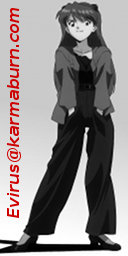|
|
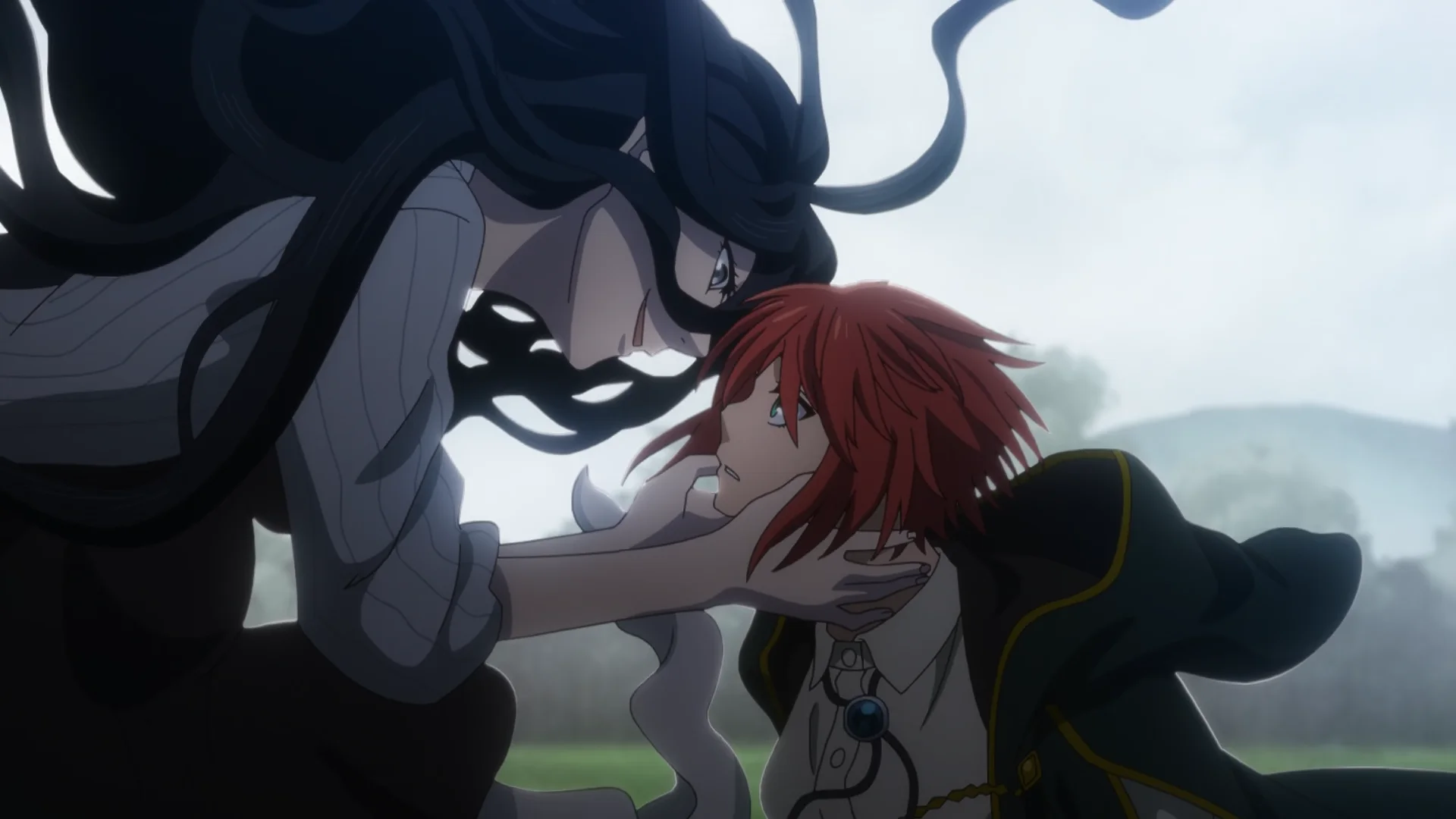
On the plus side, Ayako Doctrine invoked.
I've been buying the Mahoutsukai no Yome (The Ancient Magus’ Bride) manga for more than eight years. When I started, I didn't really think about how long I'd be reading it, let along buying it, but I do have volume 19 pre-ordered. I still enjoy it, but it's no surprise the story has evolved over that time. And when I say it has evolved, I mean it gained a magic school arc. This is also the focus of Mahoutsukai no Yome SEASON 2 Part 2, currently airing now. Seeing as how Chise is still a teenager, it does make sense to end her prolonged truancy. It's also providing more opportunities for her to interact with humans her age.
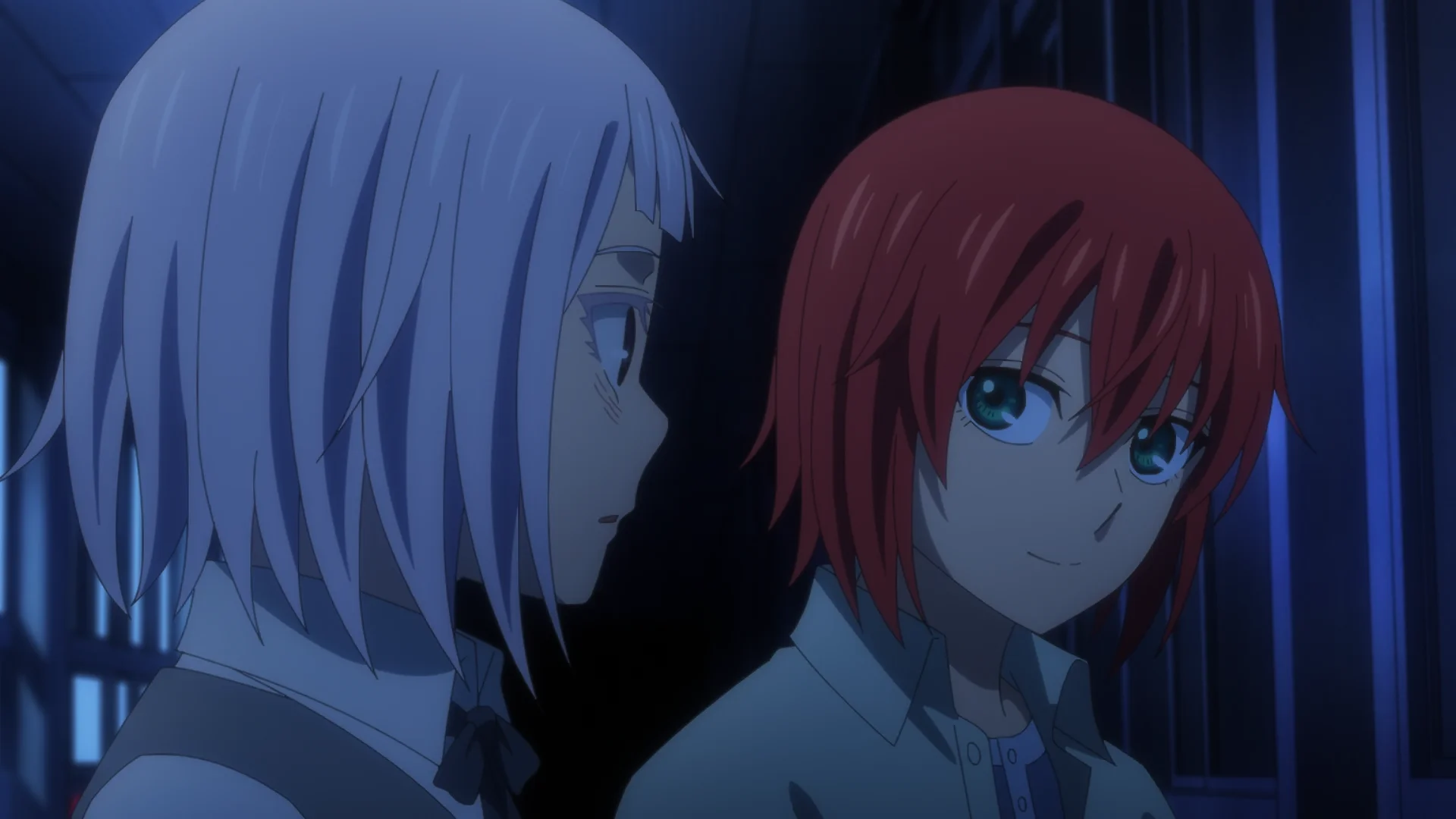
How you feel about Philomela will influence how you feel about the magic school arc.
Unfortunately, I—as the reader and viewer observing Chise's life of sorcery and mystical weirdness—don't care so much about the other humans her age. I mean, they're fine. A lot of them have had shitty lives, and some of them have exasperating hangups, as one might expect of humans in general and human teenagers in particular, but I don't find the sources of these tensions quite as engaging as one might expect. So yeah, I'm still watching the anime, and I'm still buying the manga, and I'm even still enjoying them both, but I do sometimes wish I could see what Silky has been up to instead.
Posted in Mahō Tsukai no Yome | Tags: 16-year-old love interests, Autumn 2023, AYAKO DOCTRINE, Magic School, Manga, May-December Romances, Season Introduction, Sequels | Permanent Link
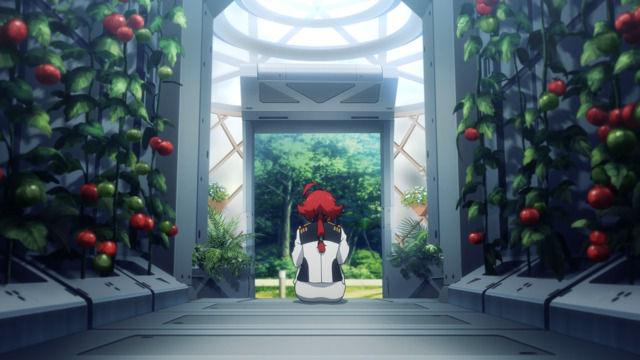
Maybe tomatoes count as a Miorine surrogate.
Continuing from my previous post about Kidou Senshi Gundam: Suisei no Majo Season 2 (Mobile Suit Gundam: The Witch from Mercury Season 2), I'm gonna go ahead and voice my primary beef with the way the show depicted Suletta's & Miorine's relationship. The short version is the series simply did not have enough episodes to adequately develop it. Or rather, it did, but it would have had to do so at the expense of something else. I suspect this is true of most of the areas that lacked sufficient elaboration for many viewers. (For example, anyone clamoring for more details about Miorine's mother, or about what tomatoes had to do with her Quiet Zero plans.)
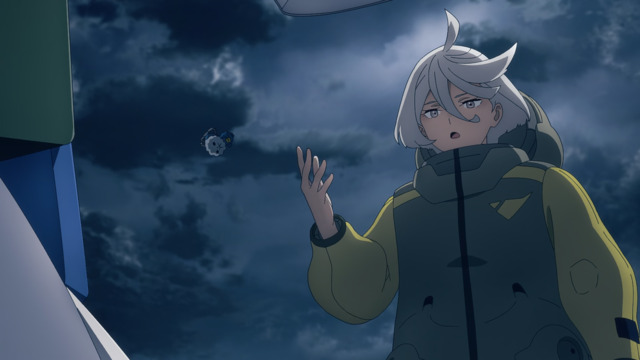
It's an act, but can you imagine Suletta doing something like this?
With regard to Suletta and Miorine specifically, nearly all of the slow, getting-closer parts that 'shippers might want occur almost entirely off-screen. Instead, we're treated to multiple instances of Miorine being distant, or cold, or outright cruel, and subsequent cathartic moments when she's realized she has fucked up and makes herself vulnerable to Suletta. All the less flashy (but still critical) incremental bond building occurs during time skips. It relies on the viewer to already be on board with the pairing, and willing to fill in the gaps with "head canon." Actually, not all of it was off-screen. A lot of it occurred during anachronistic dates across contemporary Japan shared on the Twitter.
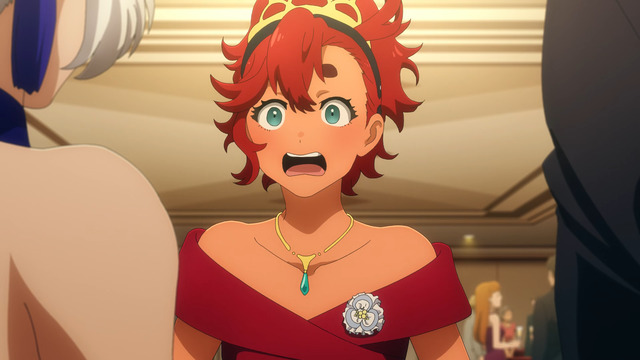
I guess this counts as a date.
I don't intend to belabor the point about these short vignettes that the @G_Witch_M account posted between cours, but I am serious about how these Suletta and Miorine Japan-tour snapshots are the clearest examples we have of the two actually going on dates or acting like a couple. This doesn't change the groundbreaking importance of their prime-time teenage lesbian marriage, but it is unfortunate that including regular romance material would have crowded out all the other Gundam-critical-type stuff that G Witch barely managed to include.
Posted in Gundam, Kidou Senshi Gundam: Suisei no Majo | Tags: 16-year-old love interests, Autumn 2022, Bad Things Happen to Good People, Bend Her Over a Kotatsu, Giant Robots, Gundam, Mecha, Romance, Season Conclusion, Sequels, Space, Space Opera, Spring 2023, Sunrise, Twitter | Permanent Link
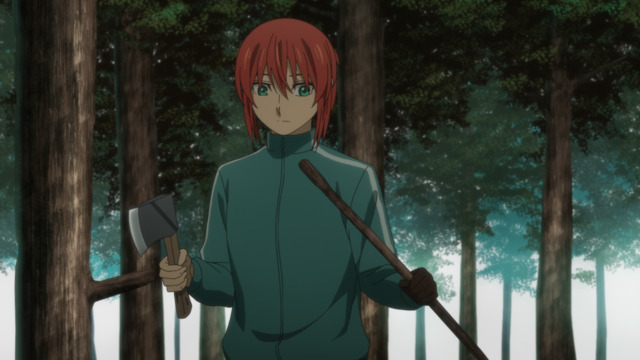
I can't see a green chav suit without thinking of Squid Game.
I can't identify anything I think the Mahoutsukai no Yome (The Ancient Magus Bride) anime is doing wrong necessarily, but I don't enjoy it as much as I like the manga. On the surface at least, the anime is great. It looks beautiful. The casting and voice acting are both spot on. The production values in general are high. And yet I mostly only find the overall experience simply okay. Does that mean the direction is at fault for not optimizing the presentation of all these elements? I dunno. I still like watching it, but it doesn't astound me, and maybe I'm just griping because I feel as if it ought to.
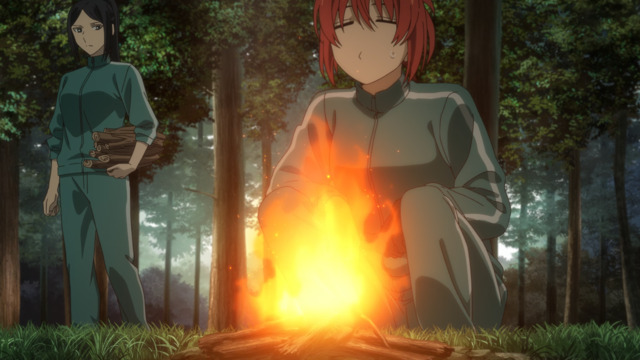
This is not Yuru Camp△.
As far as the currently airing second season goes, I suppose I'm naturally disinclined to be interested in its subject matter. Specifically, it is about Chise going to magic school. Aside from a few notable exceptions, I'm generally not enthused about magic schools as a setting. And taking someone out of an environment that was already interesting as a starting point, and then placing her in a magic school—well, that is objectively a step down. Nevertheless, I still find myself enjoying the corresponding manga arc despite my misgivings. In any case, the magic school setting is not exclusively why I'm never in a huge hurry to watch the latest episode of Mahoutsukai no Yome Season 2, but I can't rule it out as a contributing factor.
Posted in Mahō Tsukai no Yome | Tags: 16-year-old love interests, Initial impressions, Magic School, Manga, May-December Romances, Romance, Season Introduction, Sequels, Spring 2023 | Permanent Link
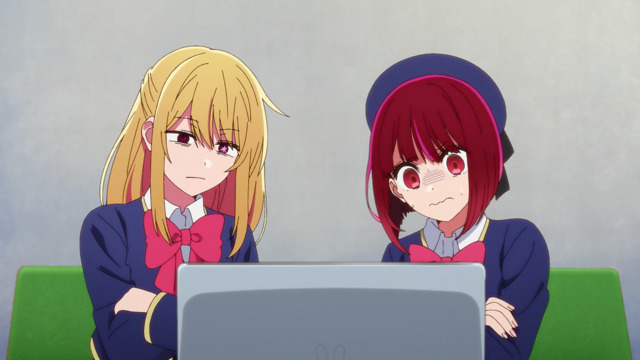
It helps that I like all the characters.
I enjoy the [Oshi No Ko] manga (localized as My Star, or My Favorite Idol, among other titles), so I'm pleased the anime adaptation is also going well. The manga is one of those stories that I happen to think is really good, but is constantly teetering on the verge of potentially going really poorly if it takes a couple of missteps. If anything, an anime adaptation for something like this is even more precarious, with additional opportunities to straight fuck it up.
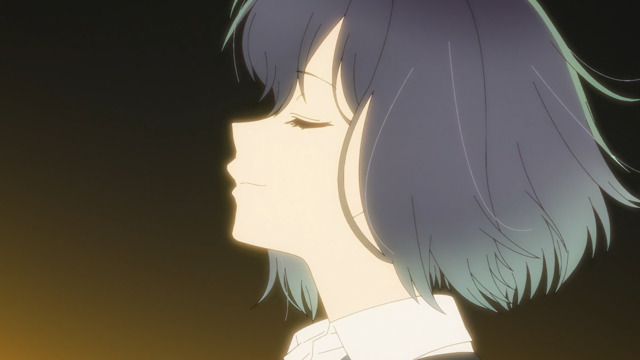
Akane is a later arrival to the show, but also excellent.
Thankfully, it's getting everything right so far. It even took the unusual step of making its first episode 90 minutes long so that it could conclude with The Thing No One Will Talk About. It seems an odd spoiler to dance around, seeing as how important it is to shaping the rest of the (still ongoing) story, but I guess I'm doing it too, albeit mostly because everyone else has thus far. It's a conspiracy of silence!
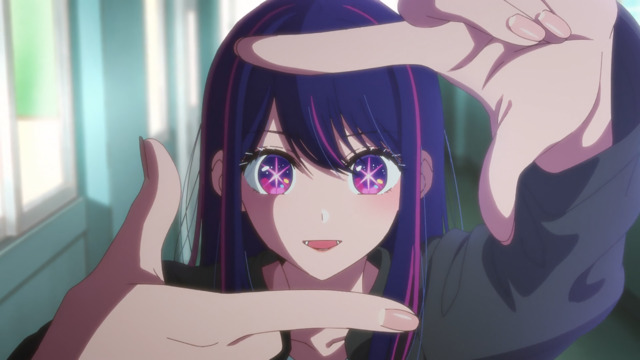
It's not easy being a superstar.
Anyway, [Oshi No Ko] is about contemporary show business dynamics. I don't know how accurately it is depicting the production and public interactions side of things, but I at least enjoy feeling as if I'm getting an insider's perspective. It's the same sort of reason why I liked Shiorobako and Otaku no Video. Don't get me wrong—I'm also in it for the revenge plot that I guess I'm not talking about. I do love me some revenge.
Posted in Oshi no Ko | Tags: 16-year-old love interests, Bad Things Happen to Good People, Idols, Initial impressions, Manga, Season Introduction, Sex, Spoilers, Spring 2023 | Permanent Link
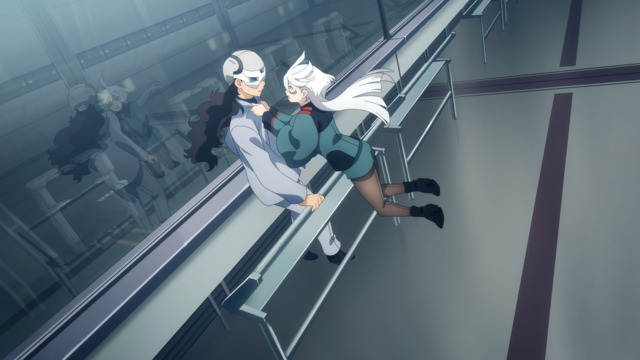
Weird how your dad never mentioned murdering all those people.
The viewpoints I see about Kidou Senshi Gundam: Suisei no Majo (Mobile Suit Gundam: The Witch from Mercury) in my sliver of the anime fandom uniformly vilify Prospera, differing only in the intensity of the condemnations. However, I still regard her as a protagonist. I also support her quest for revenge even though I'm uncertain as to the specifics of her plan. (Spoilers henceforth for the first 17 episodes.)
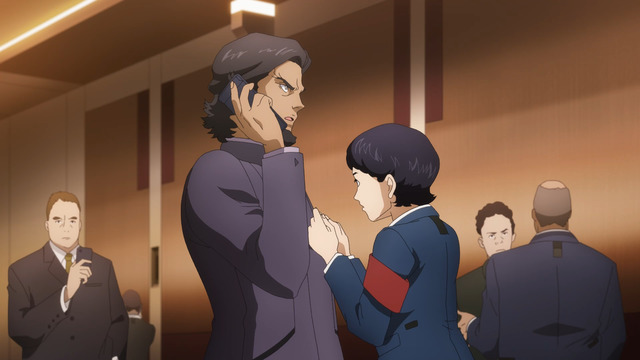
You're not young Bel, right?
A significant factor responsible for this (apparently minority) view is my unwillingness to minimize Delling Rembran's role orchestrating and initiating the mass murder depicted in the "PROLOGUE" episode. I don't believe there's been any meaningful attempt to justify the assault, so I'm mystified this doesn't come up more often. It's as if viewers collectively shrugged and concluded it was all right because we barely knew those people.
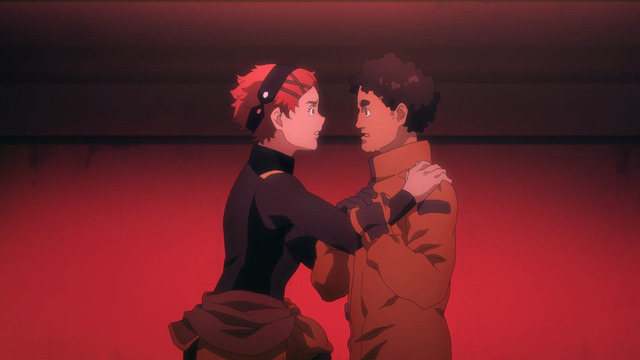
You don't always recognize the last time you'll see a loved one when it happens.
Elnora Samaya, of course, did know those people. She escaped with four-year-old Ericht as the facility's sole survivors while cold-blooded killers butchered her husband, her mentor, and everyone at Fólkvangr. (I'm unsure how many died in total, but it seems like dozens.) Consequently, this factor shapes my perspective about everything Elnora has done (and has been accused of doing) in her Propsera guise. To be clear, I also do not perceive her purported transgressions as being especially egregious. The worst accusations I can levy involve emotional manipulation, but assigning blame exclusively to Prospera for the actions others take strips agency away from those victims and reduces them to mere instruments.
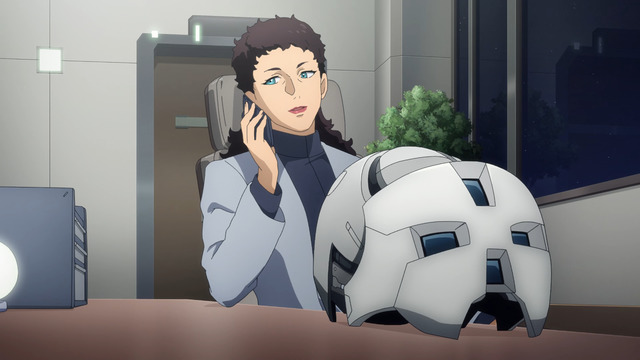
I guess she doesn't have a shitload of Suletta pictures decorating her desk.
Granted, I'm taking Prospera at her word when she offers explanations or insights. For example, I assume Ericht really was dying and that Elnora did not turn her into a child-Gundam chimera for Fullmetal Alchemist reasons. I'm also accepting Prospera's explanation to Miorine in episode 14 about enrolling Suletta to fulfill her wish of attending school while keeping her in a safe(r) environment as sincere. Likewise, I scrutinize her role as a mother through the same lens Suletta uses. Every on-screen interaction (and every historical one, according to Suletta's beaming admiration) appears authentic. Although, Prospera is possibly playing a long con, and has devoted considerable energy for decades to deceive and exploit her own daughter(s) in pursuit of a convoluted revenge plan.
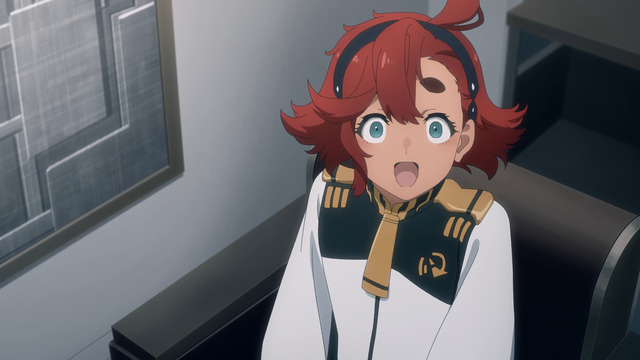
See, Suletta trusts her.
Maybe Prospera's true face (as it were) will be revealed and she'll get her comeuppance when Suletta (and Ericht) turn on her, but I'm not sure I find this prospect convincing. This is partly because I don't know the particular specifics of her revenge plan. After all, Prospera has had at least some opportunities to stab Delling in the neck, so simply offing him doesn't seem to be the primary objective.
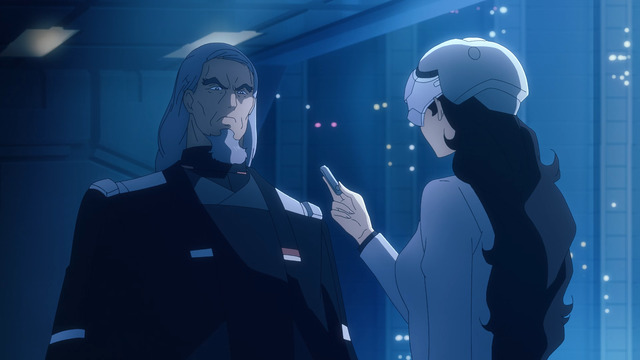
I do find it odd they use portable data-storage devices.
Moreover, I'm increasingly cognizant that The Tempest ends with a wedding, not a bloodbath. I'm disinclined to believe G-Witch will end with Elnora in ruin, and Delling triumphant. However, I'm also skeptical the conclusion will adopt the forgiveness aspects from The Tempest, particularly since Prospero's betrayal involved a loss of authority, not the literal murder of everyone he cared about. I'm pro-revenge enough that I would find such a finale distasteful, almost as a matter of principle.
Note 1: E.g., "What Delling did to that lesbian couple was objectively terrible, but not subjectively so because they weren't 'our' lesbian couple."
Note 2: Maybe she's manipulating me.
Note 3: I have no idea how Quiet Zero fits into this.
Posted in Gundam, Kidou Senshi Gundam: Suisei no Majo | Tags: 16-year-old love interests, Autumn 2022, Bad Things Happen to Good People, Built for War, DARK MAMIKO, footnotes, Giant Robots, Mamikore, Mecha, Mecha Musume, Shakespeare, Space, Space Opera, Spoilers, Spring 2023, Sunrise, War Is All Hell | Permanent Link
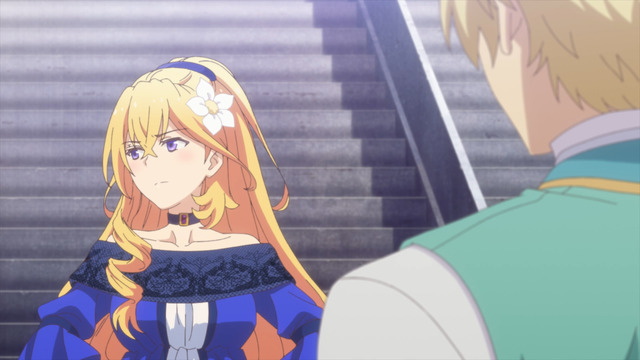
She's so happy to see him.
I don't think I would normally watch Tsundere Akuyaku Reijou Liselotte to Jikkyou no Endou-kun to Kaisetsu no Kobayashi-san (Endo and Kobayashi Live! The Latest on Tsundere Villainess Lieselotte), but here we are. It's all right. Through four episodes, I would not exactly call it a must-watch anime, but I appreciate it at least features an original idea. Well, original enough that I don't recall having encountered anything quite like it before. The basic premise involves a couple of classmates who discover that a character in a video game is able to hear and respond to their voices. Instead of examining this phenomenon to better understand the scientific, theological, psychological, or mystical implications, they use this ability to shape the video game's story in hopes of preventing a beloved character's death.
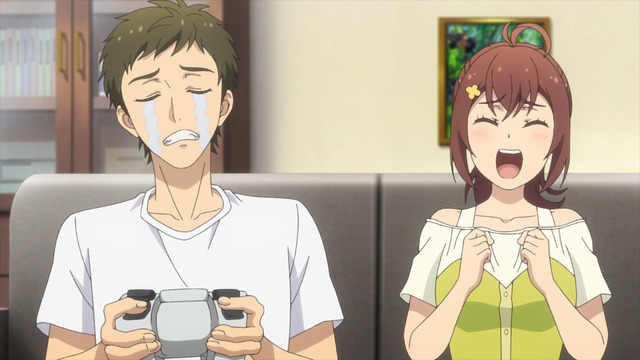
These two spend a lot of time alone together.
The titular Endou and Kobayashi from Tsundere Akuyaku Reijou Liselotte to Jikkyou no Endou-kun to Kaisetsu no Kobayashi-san do so well by the second episode that it seems all but certain some crazy plot twists must await me. Indeed, the fourth episode ends on a cliffhanger, and there's at least one likely antagonist who has made only occasional brief cryptic cameos thus far. I'm not really expecting much from this series, but I presume there will be some light romance that doesn't advance very far between the two players as they try to maneuver the video game prince into position to bend his betrothed over a, well, not a kotatsu—that would be an anachronism, but perhaps over some suitably fancy and exorbitantly expensive piece of antique furniture, thereby unlocking a sex scene the incorporates at least one desu wa during Lieselotte's throes of passion. It could happen.
Posted in Tsundere Akuyaku Reijou Liselotte to Jikkyou no Endou-kun to Kaisetsu no Kobayashi-san | Tags: 16-year-old love interests, Bend Her Over a Kotatsu, Hanakana Distortion Field, Hanazawa Kana, Initial impressions, Magic School, Romance, Season Introduction, tsundere, Unrequited Love, Video Games, Winter 2023 | Permanent Link
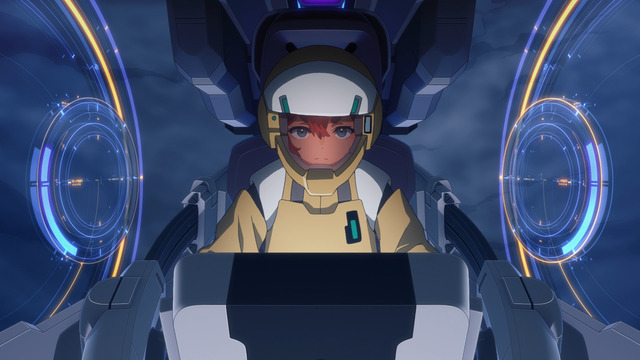
Space Oomfie.
As you may have noticed, I really enjoyed the first cours of Kidou Senshi Gundam: Suisei no Majo (Mobile Suit Gundam: The Witch from Mercury). I've watched so little from the Gundam franchise that I'm hazy on a lot of its common, recurring themes. Nevertheless, I at least know the depiction of death and the consequences of war are integral companions (in some way) to the cool-robot plastic-model-sales aspects.
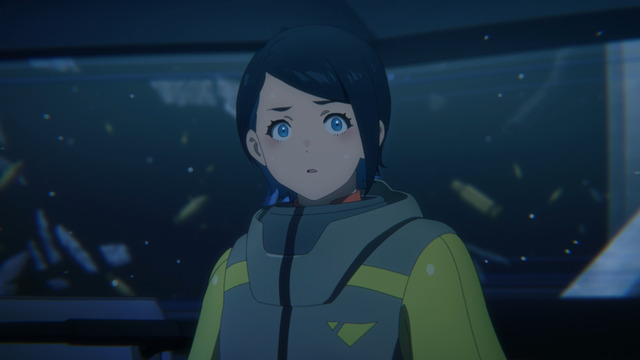
Nika realizing how much extra work killing that guy is going to create for her.
However, I'm not well versed in terms of how Gundam presents these elements or how it communicates its perspectives about them. My assumption is that it adopts a "killing is bad" approach, but I'm willing to trust it at least has a more nuanced view than something like Sword Art Online II:
2016-01-08-18:16< Evirus> The robber had already killed one person and was about to shoot the mom, the teller, basically everyone. But sniper girl, who was like five at the time, managed to get the gun and shot the robber dead. And she was a pariah ever since, even to her mother.
ANYWAY, I don't know if this ultra-pacifist view crudely depicted in SAO II in any way accurately reflects a mainstream Japanese view, nor do I know if Gundam has anything similar. For the purpose of this blog post, I'm going go assume neither are true. That said, episode 12 of Kidou Senshi Gundam: Suisei no Majo ends with a violent death that leaves one of its leads shocked and deeply troubled.
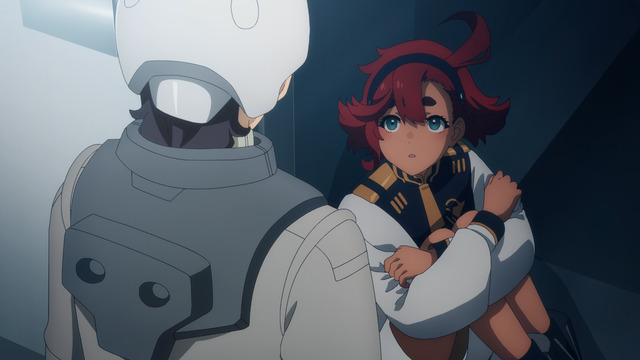
At a minimum, Prospera is way better than Sinon's mother.
Now, the most important aspect of this character's reaction is her disbelief the person responsible for the killing could appear untroubled by the act. That is the critical focus of the scene, but the implication "all killing is bad" still looms. We'll have to wait until the second cours begins in April 2023 for more clarity on these points, but anything other than unambiguously concentrating on the mental-state aspect of the scene will appear alien to me.
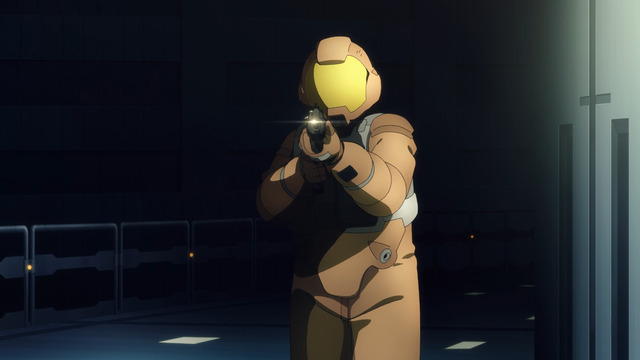
I think this qualifies as an imminent threat to life or bodily harm even if he's not using the sights.
The distinction derives from my inculcation in a common American belief that using deadly force is justified in the defense of others. The legality and scope of this doctrine varies by region and jurisdiction (as do American self-defense doctrines and perspectives as a whole, for that matter), but I presume it's at least much more common in the United States than it is in Japan. I just don't know how it's portrayed in Gundam.
Posted in Gundam, Kidou Senshi Gundam: Suisei no Majo, Sword Art Online II | Tags: 16-year-old love interests, Autumn 2022, Built for War, DARK MAMIKO, Giant Robots, Girls With Guns, Gundam, Mamikore, Mecha, Recasting, Season Conclusion, Spoilers, Sunrise, Unrequited Love, war, War Is All Hell | Permanent Link
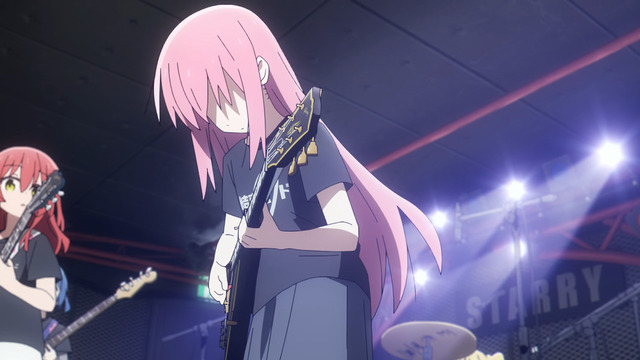
I wonder if she has her eyes open.
I look forward to Bocchi the Rock! each week because it's excellent, not because I'm anticipating big surprises or anxiously awaiting the resolution of cliffhangers. If I thought about it some more, I could probably reasonably chart out how the rest of the season is going to go, but it doesn't matter. The key to Bocchi's tremendous appeal is its impeccable execution. This is a great show, top to bottom, back to front.
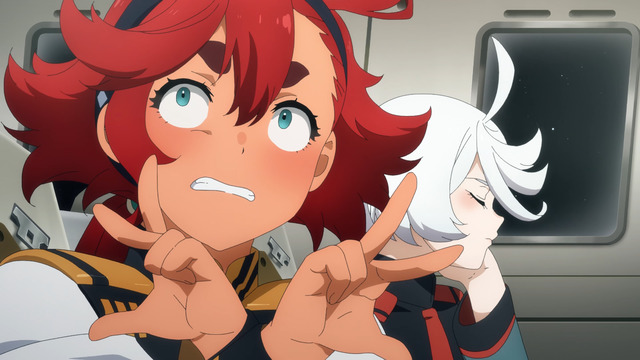
Despite what you might think, this gesture is definitely threatening.
I'm not quite prepared to call Kidou Senshi Gundam: Suisei no Majo (Mobile Suit Gundam: The Witch from Mercury) a great show even though it's also doing everything well so far. Nevertheless, I do look forward to each episode even more than I look forward to Bocchi the Rock! each week. I think the biggest contributing factor is that Witch Gundam has greater potential for unpredictable (and unsettling) developments. Even though it's been good so far, basically anything can happen because it's Gundam and because there aren't really any constraints on the possible directions the story may take.
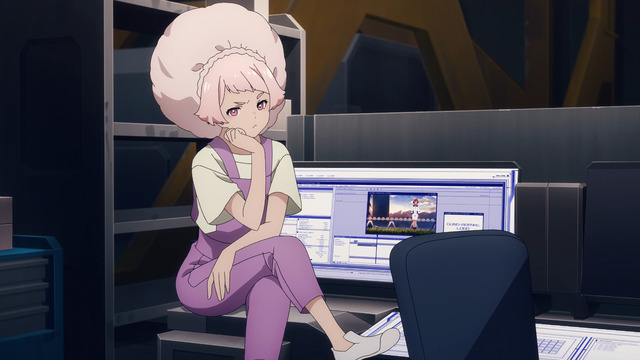
Chu-squared is one of the good people, okay.
In light of this distinction, is it worth pointing out Bocchi the Rock! is about a character with anxiety, whereas Witch Gundam is about generating anxiety in the viewer? I suppose it's not really about generating anxiety, but I don't think I'm alone in experiencing some apprehension as to how the series will play out. I do mean this in a good way, though. Consequently, on some level, this means I look forward to Bocchi the Rock! each week because I'm eager to see good things to happen to good people, while I look forward to Mobile Suit Gundam: The Witch from Mercury because I'm concerned bad things might happen to good people.
Posted in Bocchi the Rock!, Kidou Senshi Gundam: Suisei no Majo | Tags: 16-year-old love interests, Autumn 2022, Bad Things Happen to Good People, Comedy, Compare and Contrast, DARK MAMIKO, Giant Robots, Gundam, Instrument Goggles, Mecha, Music, Sunrise | Permanent Link
|
|




